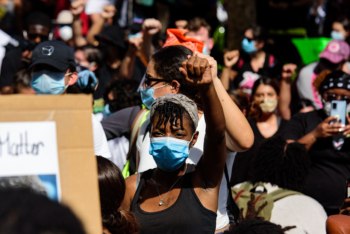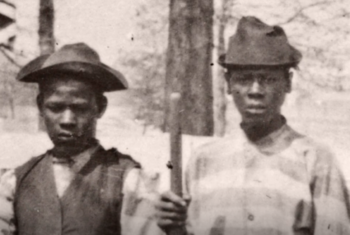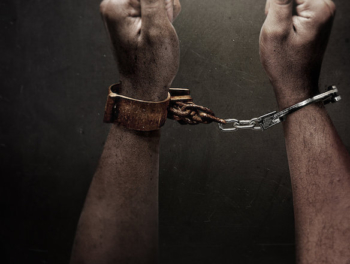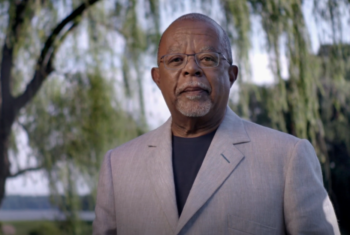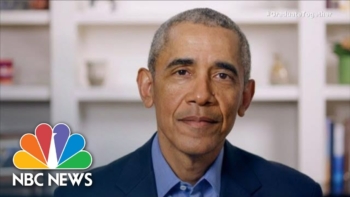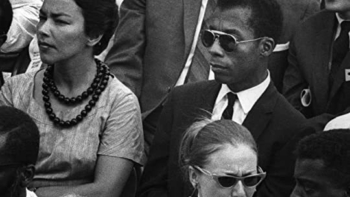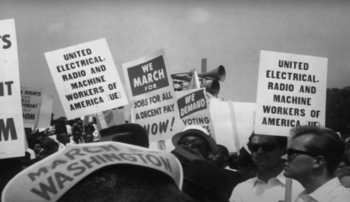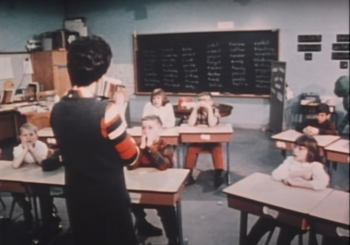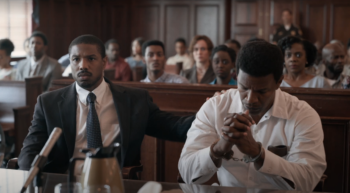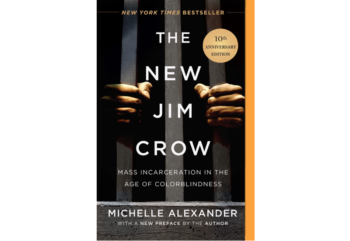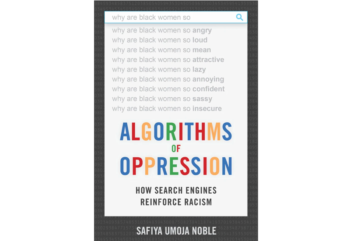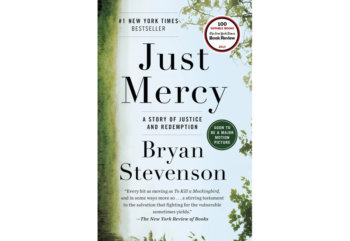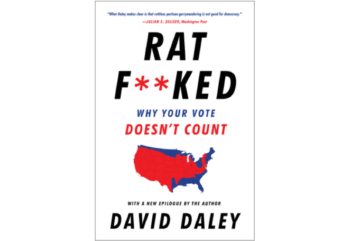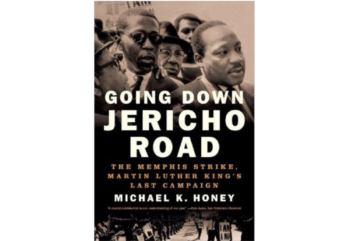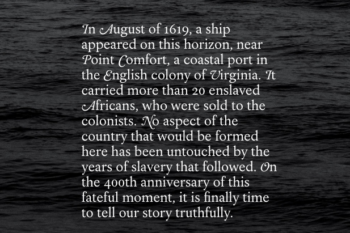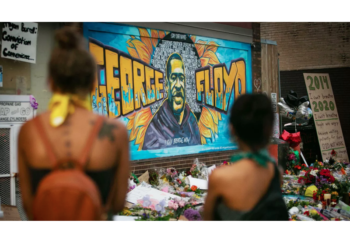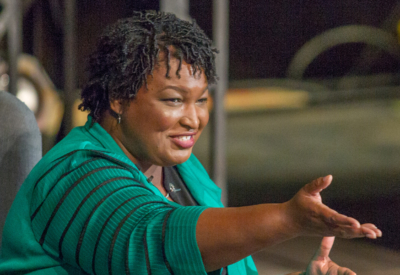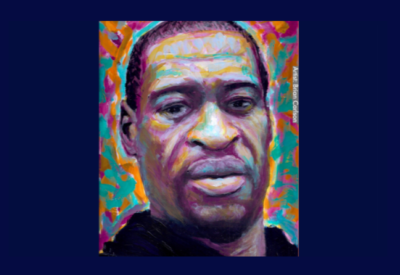Our Union and the fight for racial justice
As a union, our core mission is to make sure that our members have power and security on the job, just and dignified treatment, safe and fair working conditions, and good wages and benefits – and that means it is (and has always been) also our core mission to fight for equality. We have had incredible success furthering these goals in our contracts and for our members, when they’re at work. We’ve also used our Union’s power as an institution to support the broader struggle for justice and equality in society.
We are an organization whose membership is largely comprised of Black and Brown people, women and immigrants—people whose humanity is often shamefully disrespected when they leave their HTC union workplace and walk out onto the street. That is why HTC has always lent its weight to the fight for racial equality, and we again stand in solidarity with those fighting for justice and lasting change. We recognize and condemn that in this country, Black people have never had equal opportunity. They have been oppressed in every imaginable way and that outrage continues still.
Through the continuing practices of redlining, they are systematically denied equal rights in housing, education and healthcare.
In the White House, the Senate, the courts, and statehouses around the country, the Republican Party, to its everlasting disgrace, is shockingly and openly coordinating an elaborate strategy to enact new Jim Crow laws and policies to prevent Black people from exercising their right to vote – a right upon which all other rights depend, and one they thought they had finally gained, after so much heartbreaking struggle and sacrifice.
And, perhaps most horrifying, is the simple fact that in the year 2020, Black people continue to be lynched by racists, too often police officers, who have good reason to believe that, in our country, they can get away with murder. This undeniable reality not only victimizes those who are killed, but every Black American, because he or she must live in fear - just as their parents, grandparents, great-grandparents, etc. have done for 401 years.
We could take this opportunity to talk about all our Union has done to fight for racial justice, we are proud that there is a lot to say on this— from fighting for universal pre-K, to the opportunity for promotions that would be otherwise denied, to standing and marching with Dr. King for the Civil Rights Act and the Voting Rights Act—and we will publicize this history on our website because we are proud of it, but this section of our website is dedicated to covering where we stand right now.
Our Union is committed to racial justice and equality. We are in solidarity with those who protest for racial justice. We are against the brutality that is happening at the hands of the police.
If there are members who are uncomfortable about this message, we ask you to look at these resources below and we also ask you to remind yourself that you and your families benefit greatly from our collective power. The largest part of our Union membership is in housekeeping and EVS, the majority of whom are women and Black and Brown people. You benefit directly from their existence, we ask you to bear witness to their realities and to stand in solidarity with their struggle for equality.
Take Political Action
Apply for Citizenship
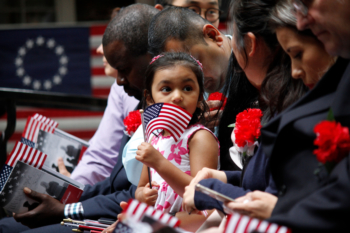
In the face of voter suppression, discrimination, and the sheer power elected officials have over our lives, it is fundamental that we be represented at the ballot boxes as immigrants and working people, and you have to be a citizen to vote. For information on eligibility and the process for applying for citizenship, click here.
If you are an HTC-represented worker whose union contract provides employer-paid-for legal assistance, you can contact the Pre-Paid Legal Fund for assistance with the citizenship process. For more information call: (212) 586-6400; ext. 4258
This guide, from the ACLU, is a valuable resource to handle encounters with police for those who are protesting right now. To read the guide, click here.
Educational Resources
Here are some excellent resources to learn more about our nation’s history of systemic racism and its deep connection to the intractable problems of poverty and inequality.
Watch:
Did you know that for many years after the 13th Amendment to the U.S. Constitution officially banned slavery, throughout the South, state and local laws and police persecution were used to effectively re-enslave many Black Americans and to deny them the right to relocate? This PBS documentary is based on the acclaimed and painstakingly researched book by Douglas A. Blackmon. Available to watch on PBS.
As of 2016, the United States had 25% of the world’s prisoners, with only 5% of the world’s population. This documentary makes the case that policies of criminalizing non-violent behavior (such as the “War On Drugs”) and the immense system of mass incarceration in this country has been largely for the purpose of disenfranchising millions of Black Americans and exploiting contract prison labor. Watch 13th on YouTube.
The period immediately after the Civil War and the abolition of slavery was a time of hope that ended with bitter tragedy and betrayal. From 1865 to 1877, the former slaves tasted the promise of freedom and citizenship. They exercised their right to vote and many were successfully elected representatives to Congress and state legislatures and to executive offices as well. They were backed by the full might of the U.S. Army and Government, until the President of the United States, Congress, and the Northern states abandoned them to the vengeance of their former owners. That betrayal consigned them to an infamous machinery of institutional terror, oppression, exploitation, apartheid, and lynching which still haunts their descendants. This is a four episode documentary, watch the first episode on PBS.
In the wake of George Floyd’s death, President Obama held a town hall featuring speakers from My Brother's Keeper Alliance on “Reimagining Policing in the Wake of Continued Police Violence.” Experts discuss previous and current policing reforms, and expand our ideas on what is possible going forward. Watch it on Youtube.
This film is based on James Baldwin’s unfinished manuscript, Remember This House. Narrated by Samuel L. Jackson, who reads Baldwin’s words and channels his righteous anger, the documentary traces the lives of three of Baldwin’s closest friends who were assassinated: Martin Luther King Jr., Malcolm X, and Medgar Evers. The film connects the Civil Rights Movement to today’s #BlackLivesMatter, and illuminates how racist minstrelsy in Hollywood perpetuated false assumptions of white superiority and Black subjugation. This award-winning documentary is a call to action against the systemic racism that still plagues our society. Watch it on YouTube.
The famous 1963 March on Washington was organized by the great civil rights leaders of the time, with the vital support of religious leaders and the labor movement. You can watch the PBS documentary about it on YouTube here.
The day after Martin Luther King, Jr. was killed, Jane Elliott, a teacher in a small, all-white Iowa town, had the remarkable idea of teaching her third-grade class about the pain and arbitrary unfairness of prejudice and discrimination by dividing them into blue-eyed and brown-eyed groups. That small creative teaching exercise shook the local community and resonated far beyond. The full video on Elliott’s class is available on Youtube.
This movie is the story of Walter McMillian’s appeal to overturn his unjust conviction for murder and sentence of death in Alabama. It is based on the memoir of McMillian’s lawyer, Bryan Stevenson (to read more about the book, look under the “Read” section of the website.) You can watch it on Youtube.
Books and Essays
We all want to consider ourselves as “not racist.” But, as Dr. Kendi argues, we need to push beyond being “not racist,” and instead must meaningfully strive to be antiracist. Being an antiracist isn’t just an identity we get to brandish, but a continuous process where we strive to overcome our own internalized (and at times unconscious) racism, and push for policy to work towards a truly just society. Kendi’s book is a personal narrative where he acknowledges that even he, as a Black man, can hold internalized racist ideas that have consequences. It is essential reading for those of us who want a meaningful course of action to address systemic racism that starts at the individual level. Buy it here.
The New Jim Crow exposes how racial discrimination is at the root of the United State’s so-called criminal justice system. Alexander compels us to see how our country’s system of mass incarceration targets Black men, through failed policies like the so-called ‘War on Drugs,” and utilizes their bodies for cheap labor. When released from prison, these former inmates are denied access to jobs, housing, and even stripped of their right to vote. Alexander calls for the fight against mass incarceration to be central to the new Civil Rights movement. Buy it here.
Safiya Umoja Noble, a Black Woman, spent 15 years working in advertising and marketing. During that time, she witnessed the increasing influence of big companies like Google in filtering the information that we see. Now a professor at UCLA, Noble adds a new racial dimension to growing concerns about corporate influence in our public discourse online. Algorithms of Oppression shows how private interests create search algorithms that highlight positive images of whiteness while harming and discriminating against people of color. Buy it here.
Just Mercy is a nonfiction work about the Equal Justice Initiative, an organization that represents people on death row, minors who were given sentences of life without parole for non-violent crimes, and inmates who have not had access to adequate legal counsel. Told through multiple personal accounts and the detailing of cases, such as overturning the wrongful conviction of Walter McMillian, Bryan Stevenson (NYU law professor and Equal Justice Initiative founder) tells the stories of Black Americans in the criminal justice system. Buy it here.
If you care about democracy in the United States, you should read this book. Daley demonstrates how Republican leadership “won” a Congressional majority through the undemocratic practice of gerrymandering. After President Obama was elected in 2008, Republicans worked incredibly hard to win elections leading up to and in 2010, at local and state levels. After their electoral victories and the 2010 census, conservative politicians gained control of the redistricting processes and redrew districts to intentionally disadvantage people of color, and ensure conservative majorities in state legislatures and in Congress. The result, in many places, is a system so rigged it hardly matters who’s running for office. Reading this is necessary, because once we understand how our democracy was corrupted we can work to undue this immoral power grab. Buy it here.
Memphis in 1968 was a place where wretched working conditions, unequal access to public services, and low wages kept most Black workers in deplorable conditions of poverty. When two Black sanitation workers were crushed like garbage in the back of a defective truck, it sparked a strike by a largely Black male workforce to fight for economic justice and workplace protections. This meticulously researched book brings together a rich cast of characters to document the 1968 Memphis Sanitation Strike. During the strike, Martin Luther King stood up to white bosses, police chiefs and politicians, forming a multiracial coalition of ministers, workers, and union organizers under the famous slogan “I AM A MAN.” While Dr. King saw the campaign as the basis of his hopes for America, he was vilified as a subversive, harassed by the FBI, and ultimately assassinated in Memphis on the tragic morning of April 4. Buy it here.
401 years ago, the first slave ship docked on the shores of Virginia. Its arrival marked the beginning of African slavery in British North America. This collection of visual media, articles and essays, from The New York Times, illuminates the central role of slavery in the formation of the United States and its continuing effects on the social, economic and political fabric of this country. Read it here.
This article, from Vox News, connects George Floyd’s death to the disproportionate effects of the COVID-19 pandemic on Black Americans. Through an exhaustive use of graphs and data, this article illustrates that Black America is not only facing a racist policing crisis, but the compounding effects of discriminatory health, housing and economic systems. Read it here.
Children's Books
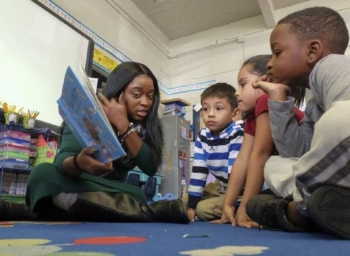
Below is a list of children’s books that deal with the difficult and important topic of racism. As we know, racial prejudice is a behavior that children learn at home, on the playground, and in the world at large. Anti-racism and self-affirmation can be taught instead, and books offer a good starting point. The books below tackle difficult subjects in ways children can understand, and offer positive representation for children of color. Here are two lists of books for your resource:
List of books to get talking about race and racism with your kids
Related News
Governor Cuomo Signs "Say Their Name" Reform Agenda and Issues Executive Order on Police Accountability
June 19, 2020 5:57 PM
In response to ongoing state-wide protests and marches, Governor Cuomo signed the ‘Say Their Name’ Reform agenda into law on June 12, 2020. HTC had previously endorsed these measures. The new laws include reforms in policing and criminal justice: a repeal and reform of section 50-a of the New York State Civil Rights Law, allowing disciplinary records of police to be released to the public in cases of misconduct, a statewide ban on police chokeholds, a prohibition of false race-based 911 reports, and the designation of the NY Attorney General as an independent prosecutor in cases involving the deaths of unarmed civilians at the hands of police.
Governor Cuomo also signed an executive order on June 12: “The New York State Police Reform and Reinvention Collaborative,” requiring local police departments to adopt a plan by April 1, 2021 in order to be eligible for future state funding. Read more...
Stacey Abrams: “I Know Voting Feels Inadequate Right Now… Just Hear Me Out” - New York Times
June 9, 2020 6:28 PM
Stacey Abrams, recent Georgia gubernatorial candidate, lawyer, author, and potential U.S. Vice Presidential choice is also the founder of the voting rights group Fair Fight Action and the most prominent American voting rights activist today.
In this Op-Ed piece, she powerfully makes the unglamorous argument that the most important way to further the cause of justice in our country is to doggedly and tirelessly work to get more Americans to vote in every election, and to fiercely resist the deliberate Republican strategy in many states to discourage and cheat us out of our right to vote.
We agree and that’s why we urge all our members to register to vote, to be counted in the census, and to become citizens when and if they can.
Please read Ms. Abrams’ essay here.
Reverend Al Sharpton: "Get Your Knee Off Our Necks"
June 8, 2020 5:18 PM
On Thursday, June 4th, 2020, Reverend Al Sharpton delivered a memorable eulogy for George Floyd at a memorial service for him in Minneapolis. The family asked the civil rights leader to give the eulogy for Mr. Floyd as this wasn’t a normal death, nor simply an untimely death, but a lynching and the family asked the Reverend who has regularly amplified the voices and experiences of being black in the United States to honor Mr. Floyd and to contextualize his murder. Rev. Sharpton poignantly and stirringly voiced the righteous demand of millions when he said, “what happened to Floyd happens every day in this country, in education, in health services, and in every area of American life. It’s time for us to stand up in George’s name and say get your knee off our necks.”
HTC urges everyone to watch Rev. Sharpton’s remarks in their entirety. You can watch it here.
Justice For George Floyd
May 29, 2020 11:22 AM
"The killing of George Floyd is another horrifying repetition of the endemic racism which has never stopped plaguing and shaming the United States. We must all get and remain righteously angry, and we must all keep working, organizing and fighting to eradicate this disease so that every black man, woman, and child can walk among us without fear."
- HTC President Peter Ward
More Criminal Justice Reform Measures Enacted in New York
Hotel Voice — April 30, 2019
"As many of you know from an editorial we published in Hotel Voice in 2017, our union has been working closely with the Innocence Project on criminal justice reform. It is my belief that this is the single most important civil rights issue in the United States, followed closely by immigration reform. The unfair incarceration of poor, disadvantaged and working class people who disproportionately are Black and Latino is a stain on the soul of our country."
-HTC President Peter Ward
Our History Fighting for Racial Justice
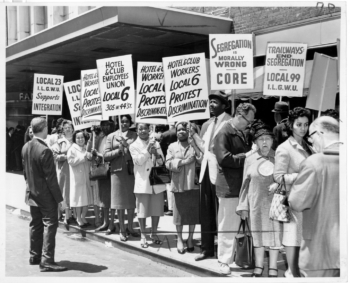
Since our founding, HTC has stood up for racial and social justice. We have used our bargaining power to further the goals against systematic racism in the workplace.
This goal of our union was evident when in 1942, we fought for, and won, a contractual industry-wide prohibition against racial discrimination in hiring in our second contract. This was at a time when luxury hotels blatantly discriminated against Black workers in all aspects of the job. With each successive contract, we have built on and strengthened that language and continue to strive to combat lingering racism and discrimination in the hotel industry today.
From negotiating contractual protections, to playing an active role in the Civil Rights movement when our members went to the 1963 March on Washington and hosted the Little Rock Nine in 1958, to currently supporting the Innocence Project and prison reform, we continue to work towards equality and justice for our members and the community at large. To read more about our Union’s history, click here.


